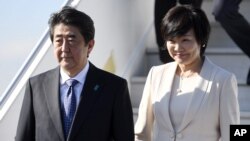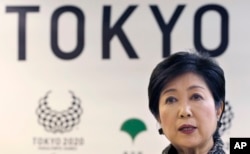Japanese Prime Minster Shinzo Abe’s falling approval ratings and his party’s recent defeat in the local Tokyo metropolitan election, put at risk his longstanding goal to revise the country’s pacifist constitution, even if his hold on power remains intact for now.
“I don’t know that it is dead, but it is a lot less likely than it was a just a few weeks ago,” said regional security analyst Grant Newsham with the Japan Forum for Strategic Studies in Tokyo.
Eroding scandals
Until recently Abe, who has been in office since 2012, had enjoyed strong popular support, mostly for his pro-business economic reforms to stimulate the long stagnate economy. His conservative Liberal Democratic Party (LDP) and ruling coalition also hold super majorities in both houses of the Japanese parliament, known as the Diet.
But the Japanese leader’s popularity has recently plummeted to 36 percent in one national poll because of allegations that he helped a friend secure free land and approvals to establish a veterinary college, and that his wife made secret donations to an ultra-nationalist kindergarten that is accused of promoting bigotry against Chinese and Koreans. The prime minister has denied these charges but the perception of cronyism and corruption has seriously damaged his standing with the public.
“The number one reason why they don’t approve of Mr. Abe anymore is because people don’t find him trustworthy,” said Koichi Nakano, a political science professor with Sophia University in Tokyo.
Constitution referendum
The Japanese public remains divided over Abe’s proposal to modify Article 9 of the post World War II constitution prohibiting Japan from going to war to settle international disputes involving the state.
Conservatives want to loosen constraints on the military to counter potential threats from countries like China and North Korea that are increasing their military and nuclear capabilities. The U.S. supports Japan taking a more prominent role in maintaining regional security.
Supporters of the pacifist constitution argue that renouncing Article 9’s restrictions on the use of force will entangle Japan in international conflicts, most likely in support of its U.S. military ally. China and other countries in Asia that suffered under Japanese occupation during World War II also object to any change to the country’s pacifist constitution.
Abe’s proposal is a compromise that would preserve the Article 9 clause renouncing the right to wage war, but would add a clause legitimizing the country’s Self-Defense Forces.
Some military analysts say the constitutional changes proposed by Abe are minor and also advocate a significant boost in Japanese military spending to deal with growing regional threats.
In May, Abe said he wanted to pass the Article 9 constitutional amendment by 2020.His coalition may have the two-thirds majority support needed to pass the measure, but a constitutional change also requires a nationwide referendum voting in favor, which given Abe’s decline in the polls now seems unlikely.
“I don’t think that his chances of success are particularly great at the moment, and he will be squandering some political capital if he were to make that his prime objective. And I think that would be a mistake in my opinion,” Newsham said.
Rivals
Following the July municipal election victory of Tokyo Governor Yuriko Koike’s party Tomin First No Kai, or Tokyoites First, over Abe’s LDP, the governor is being seen by many as an emerging rival in the 2018 parliamentary election.
The governor’s party won 79 of the 127 seats in the local assembly, dropping the number of LDP seats from 57 to 23.
However Koike is a former LDP defense minster and supports conservative economic and national security polices.
The liberal opposition Democratic Party that held power from 2009 to 2012 has been unable to make any major political gains despite Abe’s alleged scandals, his controversial support for a more proactive military and for nuclear power following the 2011 Fukushima nuclear meltdown.
“The opposition is quasi dead, so for practical purposes, no, there is nothing else,” said Robert Dujarric, the director of the Institute of Contemporary Asia Studies at Temple University in Tokyo.
Until recently, Abe had been projected to win a third three-year term as LDP leader and prime minister, but the likelihood of that is no longer certain. With his party’s strong majorities in the Diet until the 2018 elections, analysts say, Abe’s position is not in immediate jeopardy, although his government may struggle to push forward his conservative agenda.
Youmi Kim in Seoul contributed to this report.





